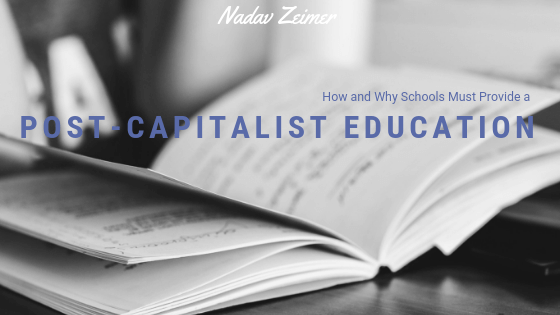In today’s age, our attention is crucial. It’s what Google and Facebook’s business models are built around, and it’s why they’re able to offer their products for free. Our attention is sold as advertising. These platforms encourage us to create our own content to draw others to these services so they give their attention as well. If this is the future of our economy, how does the education system need to be reformed to prepare kids for the future?
The current education model was designed around getting children ready for working in industrial jobs. Workers needed to be able to follow directions, do necessary recordkeeping and operate machinery. Schools purposely discouraged curiosity and purpose as they got in the way of the above objectives. Because of this, art and music were viewed as not only unimportant but a threat to the more important activities needed to get a good job. During the industrial age, jobs were essential because people needed to buy products to provide jobs for others. We sold our labor and were then encouraged to buy stuff with the money we earned. Capitalist leaders used labor to run machines and took advantage of economies of scale and mass production to be able to offer us products for cheap. While that worked well for a long time, machines are no longer scarce and the system no longer works.
Because our economy has changed, this current education model no longer makes any sense. The new model of education needs to help students learn the economic value of their time and attention. The current education system focuses on getting students a “good” job, which means something in the STEM field. Yet, increasingly, more and more jobs are being done by automation or independent contractors.
Instead of encouraging students to pursue a career that may not exist by the time they graduate, we should instead be teaching them how to be better independent contractors. With the increase of contract labor, students are going to start working for themselves instead of working for others. Students need to learn how to build and monitor their own brand. Next generation companies will not be looking for labor, but instead, content that attracts users, which means curiosity and purpose will be crucial.
Students need to be given a choice in their learning for at least part of their day. That doesn’t mean eliminating any subject students aren’t interested in; learning how to do what we don’t like is important too. But we have the opportunity to offer more choices for high school students to ask questions about topics they have an interest in so that they can exercise use of their attention to learn something independently. The teacher’s role is critical as a coach, focused on how students use their time and attention, who has tools to help them improve like breathing, meditating, using exercise to improve focus.
With a new burgeoning economy, schools have an opportunity to put an increased focus on learning how to learn and learning how to produce original content rather than merely expecting students to consume content and rehash the obvious facts. Knowledge will likely serve in the future as a greater marker of wealth than stuff. Think Bill Gates and his focus on reading. Think of how much can be learned through the internet, basically anything you would ever want to know. Learning how to be a better learner will give our students an edge in the digital age. Learning how to teach other people and make them learn will make them even more successful as other users will seek their content to get ahead.
Students should be taught how valuable their attention is, and how to focus it on achieving learning goals if they desire to be successful professionally. So, besides learning, what else should kids be learning in school? Among other things, informational, economic and psychological freedoms; critical thinking; and coding. Informational freedom is our right to access the information we want. Limitations on digital information should not exist. Students should learn about copyright laws, creative commons attributes and digital privacy issues.
Economic freedom is our freedom to pay for our basic needs: food, shelter and clothing. If you were to quit your job today, would you be able to afford those things? If the answer is no, then you’re not economically free. The decisions you make regarding jobs and partners are not free decisions when you’re not economically free. Students should learn what economic freedom is, and how they can achieve it.
Psychological freedom is the freedom to act upon your interests and desires without your fear and existing beliefs holding you back. Students should be taught the self-regulation that needs to be done to free themselves from these setbacks.
Critical inquiry is a vital skill in today’s world of fake and biased news and ever-present advertising. “What evolution is to DNA, critical thinking is to knowledge,” writes Albert Wenger. Therefore if our students are going to play a role in advancing the knowledge economy and enjoy the economic benefits of doing so, they must master engaging intellectually with questions that don’t have clear answers. As a result, students also learn how to avoid being taken advantage of by advertisers and how to analyze advertisements and determine the illusions that they perpetrate.
Scripting is an essential skill in today’s tech economy. As APIs are increasingly made available, end users will have the opportunity to automate their work and even offer their automations to others. Even extremely complex mathematical algorithms like Artificial Intelligence are being made available to users through simple APIs, allowing us to leverage highly specialized tools without having to know exactly how they work. All students must have an option to learn the basics of coding in school, so they’re able to build tech tools that work for them. Students who know how to script bots will economize their time and effort, giving them an advantage in the usability or creativity of their digital creations.

